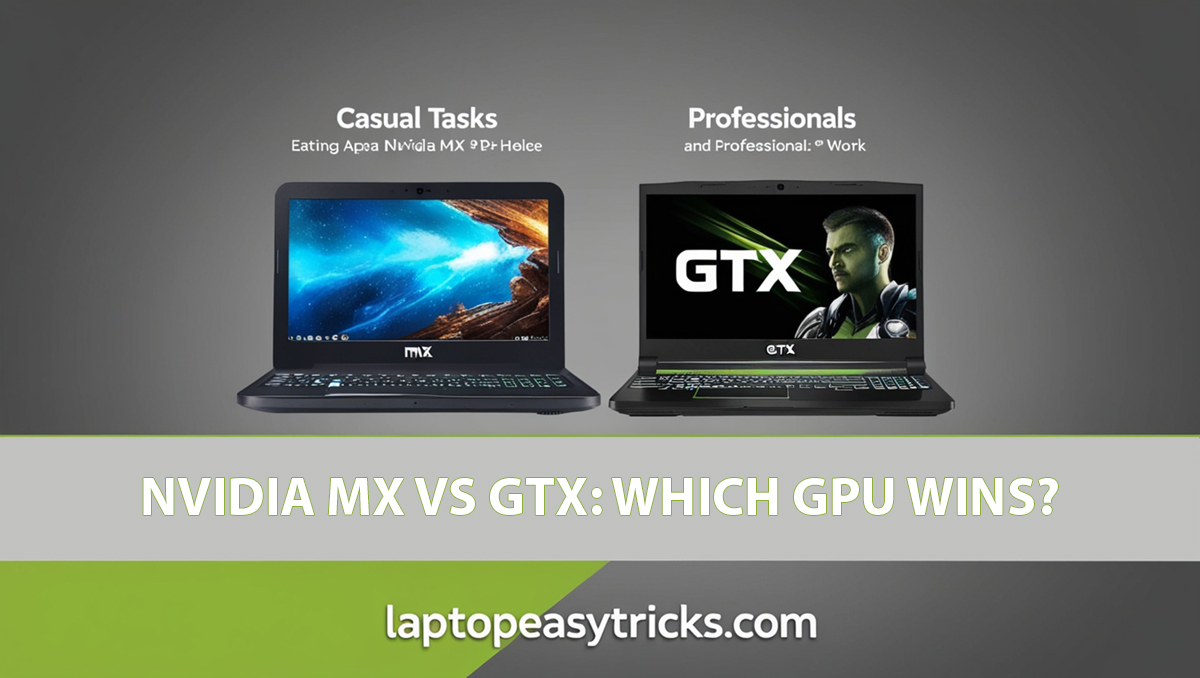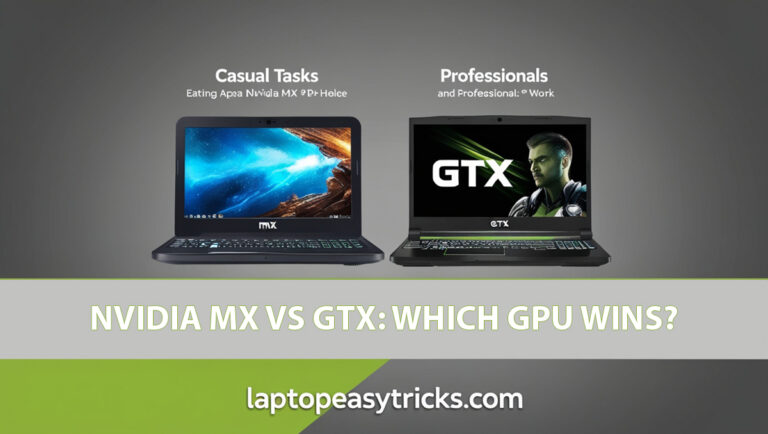When choosing a laptop, the graphics card plays a significant role in determining its performance, especially for gaming, content creation, and multitasking. NVIDIA’s MX and GTX series are among the most popular GPU options, but they cater to different user needs. This guide compares NVIDIA MX vs GTX to help you decide which is best for your workload, gaming habits, or creative tasks. Follow Laptopeasytricks.com!!!
Overview of NVIDIA MX and GTX GPUs
NVIDIA MX Series
- Purpose: Entry-level GPUs for everyday tasks, light gaming, and casual creative work.
- Best for: Students, office workers, and budget-conscious users.
- Examples: MX130, MX250, MX330, MX450.
NVIDIA GTX Series
- Purpose: Mid-range to high-end GPUs for gaming, rendering, and professional work.
- Best for: Gamers, content creators, and professionals needing advanced performance.
- Examples: GTX 1050, GTX 1650, GTX 1660 Ti.

Comparison Table NVIDIA MX vs GTX
| Feature | NVIDIA MX Series | NVIDIA GTX Series |
|---|---|---|
| Performance | Basic, suitable for light workloads | High performance for gaming and multitasking |
| Gaming | Limited to older or less demanding games | Handles modern AAA titles at medium to high settings |
| Power Efficiency | Highly efficient, ideal for laptops with long battery life | Moderate efficiency with higher power consumption |
| Memory (VRAM) | 2GB–4GB GDDR5/LPDDR5 | 4GB–8GB GDDR5/GDDR6 |
| Price | Affordable, budget-friendly | Higher cost, premium performance |
| Target Users | Casual users, students | Gamers, content creators, professionals |
Detailed Comparison NVIDIA MX vs GTX
1. Performance
NVIDIA MX Series
- Designed for light tasks such as web browsing, streaming, and office work.
- Limited capability for demanding applications or multitasking.
- Suitable for light games like Minecraft, League of Legends, or older titles at low settings.
- Rating: 6.5/10
NVIDIA GTX Series
- Built for gaming and heavy workloads, capable of running AAA titles like Cyberpunk 2077 or Red Dead Redemption 2 at medium to high settings.
- Excellent for creative tasks like video editing, 3D modeling, and rendering.
- Rating: 9/10
Winner: GTX Series for superior performance.
2. Gaming Experience
NVIDIA MX Series
- Can handle casual or older games but struggles with modern, graphically demanding titles.
- Recommended for games with low graphical requirements or lower resolution settings.
- Rating: 6/10
NVIDIA GTX Series
- Delivers an excellent gaming experience, with smooth frame rates at Full HD and higher resolutions.
- Supports modern gaming technologies like NVIDIA G-Sync and Ansel.
- Rating: 9/10
Winner: GTX Series for gaming enthusiasts.
3. Power Efficiency
NVIDIA MX Series
- Optimized for power efficiency, making it ideal for ultrabooks and lightweight laptops.
- Helps maintain longer battery life.
- Rating: 9/10
NVIDIA GTX Series
- Consumes more power, which can reduce battery life during intensive tasks.
- Better suited for laptops with dedicated cooling systems and plugged-in usage.
- Rating: 7/10
Winner: MX Series for energy efficiency.
4. Memory (VRAM)
NVIDIA MX Series
- Limited to 2GB–4GB VRAM, restricting its ability to handle large textures or high-resolution gaming.
- Rating: 6/10
NVIDIA GTX Series
- Offers 4GB–8GB VRAM, making it capable of handling high-resolution textures and multitasking.
- Rating: 9/10
Winner: GTX Series for multitasking and graphical fidelity.
5. Price and Value
NVIDIA MX Series
- Budget-friendly, making it accessible for casual users and students.
- Found in laptops priced between $500–$800.
- Rating: 8.5/10
NVIDIA GTX Series
- Higher cost but delivers significantly better performance.
- Laptops with GTX GPUs typically cost $900–$1,500 or more.
- Rating: 8/10
Winner: MX Series for affordability; GTX Series for value in performance.
Personal Ratings NVIDIA MX vs GTX
| Feature | NVIDIA MX | NVIDIA GTX |
|---|---|---|
| Performance | 6.5/10 | 9/10 |
| Gaming | 6/10 | 9/10 |
| Power Efficiency | 9/10 | 7/10 |
| VRAM | 6/10 | 9/10 |
| Price/Value | 8.5/10 | 8/10 |
| Overall | 7/10 | 8.5/10 |
Which GPU Should You Choose?
Choose NVIDIA MX if:
- You need a budget-friendly GPU for casual use or light gaming.
- Portability and battery life are more important than performance.
- You’re a student or casual user looking for basic multitasking.
Choose NVIDIA GTX if:
- You’re a gamer or professional requiring high performance for gaming or creative work.
- You need a GPU that can handle demanding applications like video editing or 3D rendering.
- Visual fidelity and smooth gameplay are your top priorities.
Conclusion
The NVIDIA MX series is perfect for casual users and students who prioritize affordability and energy efficiency, while the NVIDIA GTX series caters to gamers and professionals who demand high-end performance. Assess your needs and budget to determine which series aligns with your expectations.
>>> Read more: How to Enable Ray Tracing on a Gaming Laptop

